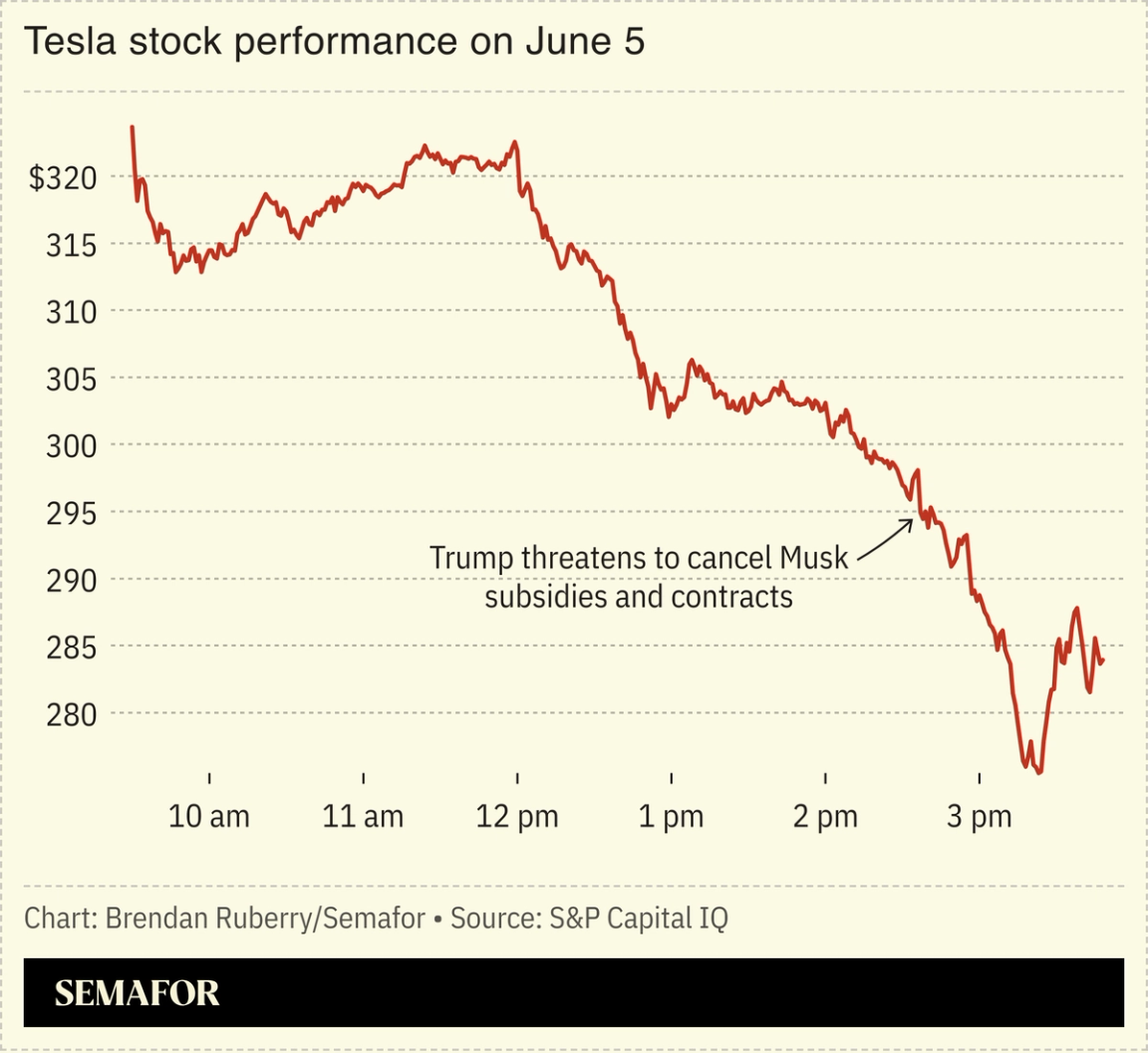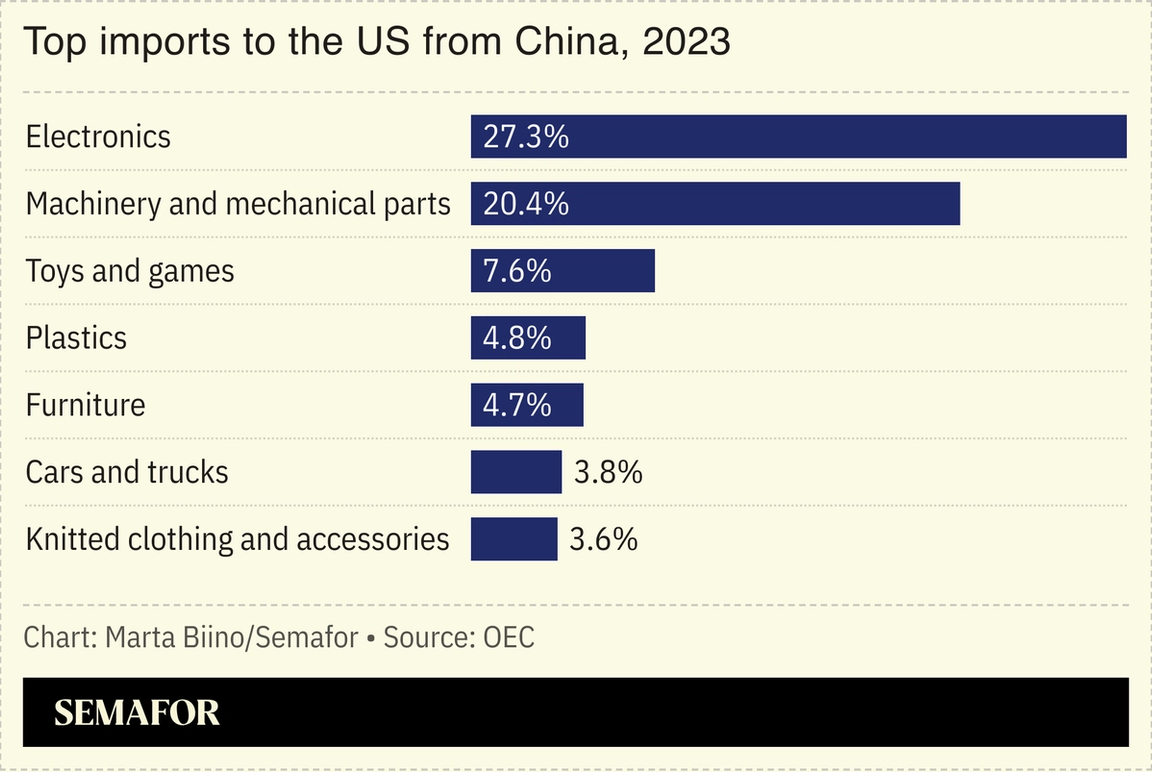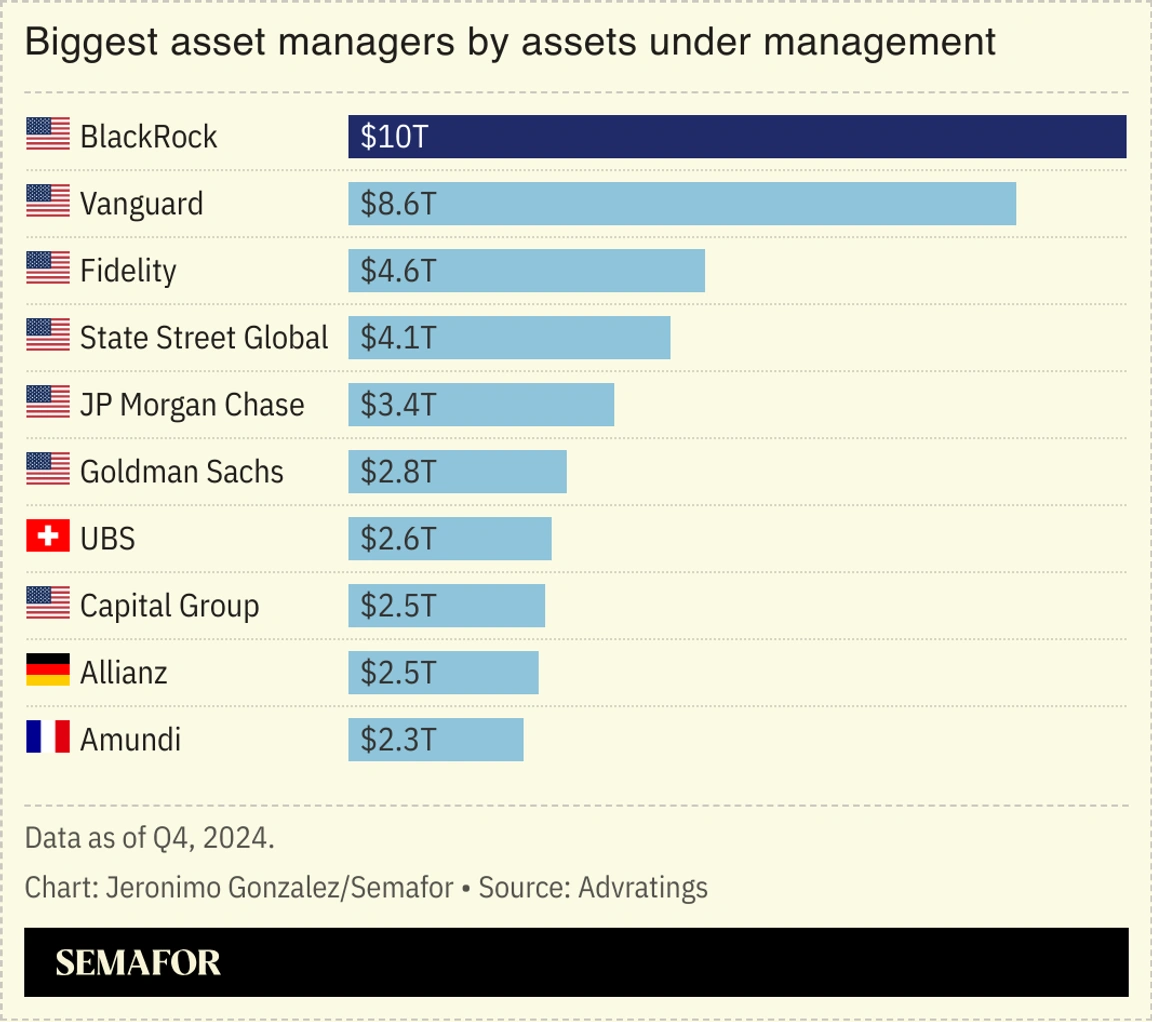| | In today’s edition: What’s next after the Trump-Musk feud. ͏ ͏ ͏ ͏ ͏ ͏ |
| |  | Principals |  |
| |
|
 - Implosion impact
- Trump’s Senate lobbying
- Breakup fallout
- The media challenge
- Travel ban pushback
- Data clash looms
- US-China trade talks
- BlackRock’s Texas play
PDB: Top Republican worries about cost of Trump Army parade  Trump attends UFC in Newark … Harvard gets relief on foreign student ban … NATO nears agreement on expanding spending target
|
|
Inside the Trump-Musk implosion |
 Nathan Howard/Reuters Nathan Howard/ReutersPresident Donald Trump and Elon Musk’s messy breakup could have long-term ramifications for the GOP’s congressional primaries and damage the administration’s relationship with Musk-aligned companies and allies. But lawmakers are confident the drama won’t impact Trump’s megabill, with Senate Majority Leader John Thune saying they just have to keep their “heads down.” The Trump-Musk feud burst into the open on Thursday after the world’s richest man spent days attacking the president’s “big, beautiful bill,” but tensions had been building. “Totally predictable,” one person close to the White House said. Another person close to Trump likened the spat to the classic movie Clash of the Titans. That drama is the last thing the administration had wanted, though, and Musk’s tweets Thursday invoking the “Epstein files” caught officials off guard. Press Secretary Karoline Leavitt called it “an unfortunate episode,” arguing Musk is upset because Trump’s bill doesn’t include provisions he wants. — Shelby Talcott and Burgess Everett |
|
Trump’s big, beautiful tug-of-war |
 Annabelle Gordon/Reuters Annabelle Gordon/ReutersUndergirding the Trump-Musk beef is the president’s signature piece of legislation — and the president is fully focused on getting his megabill out of the Senate after spending his first few months in office focused outside the Capitol, Semafor’s Burgess Everett reports. He’s making headway with fiscal conservatives like Sens. Rick Scott of Florida and Ron Johnson of Wisconsin, both of whom spoke privately with Trump this week. Scott told us that Trump “wants his deal closed,” and Johnson said he’s aware that Trump’s not too happy with his media tour trashing the bill. “I’m taking to heart that he’d like me to be a little more positive,” Johnson said. The only senator the White House is currently tangling with is Sen. Rand Paul. He shrugged: “They say you’re not over the target if you’re not getting flak.” |
|
Ramifications of the Trump-Musk breakup |
Is a Trump-Musk détente on the horizon? White House aides are expected to speak with Musk the phone today, Politico scooped. The two men should “make peace for the benefit of our country,” Bill Ackman wrote on X. One reason Musk might be persuaded to patch things over: Tesla shares are down a whopping 14%, though they rose slightly Friday morning on news of the White House-Musk call.  Trump has also threatened to cancel Musk’s government contracts. The world’s richest man also has ways to make life difficult for Trump: The New York Times chronicles eight ways the two could inflict pain on one another. Meanwhile, Silicon Valley executives are picking sides, per Wired. The tech industry will feel pain for decades and the “biggest loser will be the average American,” Semafor’s Reed Albergotti writes. The winner, David Weigel argues, is the MAGA right. |
|
Politics, when nothing’s behind the scenes |
 Kent Nishimura/Reuters Kent Nishimura/ReutersThe public breakdown between Trump and Musk exposes a unique challenge for journalists in the Trump era: What to do when the biggest story is happening before the world’s eyes. “What, exactly, are journalists — with our sources, our access, our experience — supposed to do here?” Semafor’s Ben Smith writes. “The most plugged-in people in Washington are reading the same tweets you are, marveling. The persons-familiar who populate so much of the reporting about Trump are no more or less familiar with his Truths than you are, and are speculating on his plans and motives — Is this breach final? Will it heal soon? — just the same as many Americans. This is a feature of a presidency that sees itself as media: Journalists can become mere television critics.” |
|
US, China set for more trade talks |
The US and China are on track for more trade negotiations after Trump held his first call with Chinese leader Xi Jinping since retaking his office. Trump characterized the call as productive, saying they’d discussed issues related to rare earth mineral exports from China and had “straightened it out.” The Chinese readout didn’t mention rare earths, though, and noted that Xi encouraged Trump to “remove the negative measures taken against China.”  Trump said Treasury Secretary Scott Bessent, US Trade Representative Jamieson Greer, and Commerce Secretary Howard Lutnick — who recently had harsh words for Beijing — would meet with Chinese representatives soon. The call may be a sign of a thaw, but the markets aren’t convinced. Meanwhile, US imports fell sharply in April amid tariffs, while the May jobs report out today will offer clues about US economic health. |
|
Republicans raise concerns over Palantir |
 Gage Skidmore/Flickr/CC BY-SA 2.0 Gage Skidmore/Flickr/CC BY-SA 2.0Republican data-privacy advocates in Congress are pushing back on the Trump administration’s effort to merge agency data with help from tech firm Palantir, Semafor’s Eleanor Mueller reports. Their concern: that future presidents could abuse a trove of financial, medical and other information on Americans. “It’s dangerous,” Rep. Warren Davidson, R-Ohio, told Semafor. “When you start combining all those data points on an individual into one database, it really essentially creates a digital ID. And it’s a power that history says will eventually be abused.” Though Davidson is an outlier in his party, other GOP members and aides voiced similar concerns. Data privacy has divided Republicans before: Hardliners in the House derailed an effort by leadership to reauthorize a key surveillance law last year. Palantir CEO Alex Karp told CNBC Thursday that the company is “not surveilling Americans.” |
|
Opponents weigh response to travel ban |
 Elizabeth Frantz/Reuters Elizabeth Frantz/ReutersTrump’s order banning travel to the US from a dozen nations triggered swift pushback from Democrats, civil rights groups, and some of the targeted countries. Chad, one of the affected nations, said it would suspend visas to US citizens, while Venezuela told its citizens being in the US is a “great risk.” Rep. Gregory Meeks, D-N.Y., predicted the ban would inspire court challenges. “You got to do what we did the last time he tried to do something crazy like this: rally the people, take it to court and challenge it,” he told Semafor, citing successful challenges to Trump’s first-term ban affecting Muslim-majority nations. Republicans were less critical: Rep. Anna Paulina Luna, R-Fla., said she supports the ban because “a lot of these countries are also guilty of human rights abuses.” But Rep. Mike Lawler, R-N.Y., called for Haiti to be left out. — Morgan Chalfant and Eleanor Mueller |
|
BlackRock’s playbook for the ESG backlash |
 BlackRock, the world’s largest asset manager, is back in business in Texas, after the state removed it from a blacklist of financial firms that Republican officials deemed to be prejudiced against the oil and gas industry, Semafor’s Tim McDonnell reports. The decision represents a victory for Republican officials around the US, who have argued that environmental, social and governance investment policies at firms like BlackRock have led them to put “woke” politics ahead of their fiduciary duty. But it’s an even bigger victory for BlackRock, which proved capable of navigating a high-profile political storm without making too many costly compromises to its core practices and offerings. “A lot of this was about gamesmanship,” Shivaram Rajgopal, a finance professor at Columbia Business School, told Tim. And Tim’s take: BlackRock’s response to backlash regarding its ESG policies “looks like an expert case of ‘greenhushing.’” |
|
Blindspot: Counterterrorism and travel |
 Stories that are being largely ignored by either left-leaning or right-leaning outlets, curated with help from our partners at Ground News. What the Left isn’t reading: A 22-year-old is overseeing the Department of Homeland Security’s terrorism prevention hub, ProPublica reported. What the Right isn’t reading: CNN’s Christiane Amanpour, who is British, likened traveling to the US as a foreigner to traveling to North Korea.
|
|
 Top Chef, which airs its 22nd season finale next week, has been shaping how we think and talk about food for the past two decades. This week, Ben and Max talk to longtime judges Tom Colicchio and Gail Simmons about how Top Chef has influenced the restaurant industry, how food media has evolved, and why the show has gotten nicer over the years. Plus, they share the social media food trends they hate the most. Listen to the latest episode of Mixed Signals now. |
|
|